When Auckland Emeritus Bishop Patrick Dunn was asked by Holy Cross Seminary rector Fr Matthew Vadakkevettuvazhiyil to teach Maori language and culture to first-year seminarians, he was hesitant to accept the role.
“I can’t see properly and I’m not Maori,” Bishop Dunn said. “I had huge doubts doing it but mostly because of my eyesight. Because I can’t read to prepare. It’s not easy to prepare.”
Bishop Dunn taught seven classes in the second semester and asked Fr David Dowling to talk with the seminarians to see if they found the classes useful.
“I’m focussing mostly on my own experience in working in a Maori world and also focussing on the common prayers like the Hail Mary or the first verse of the national anthem. Things that would give them a better insight into Te Reo. And it’s Maori language that they’ll likely be using,” he said.
Bishop Dunn said he learned Te Reo as a young priest in the 1970s.
“There was a little policy which didn’t last for long. We diocesan priests were placed with Mill Hill priests to work in the Maori world,” he said.
He spent two years at Te Unga Waka in Epsom and was a chaplain to the Catholic Maori community in Mangere.
“The Mill Hill priests were very strong on learning the language. And I was quite keen to learn it, too,” the retired bishop recalled. “Especially when I was with the Mill Hills, any gathering I went to was in Maori. So, I was hearing the language all the time which was quite an incentive to study to find out what they were saying.”
He said it is a good idea for the seminarians to have insights into Te Reo and what the words actually mean.
Years ago, when he was growing up, Bishop Dunn said they used to refer to one suburb as “Waikowa”. However, when he worked with Maori, they would call the suburb “Waikowhai”.
“I thought, where is that? But Wai is water and kowhai is the kowhai tree. That’s the place by the Manukau harbour where there must have been a lot of kowhai,” he explained with a laugh.
Bishop Dunn said he also wanted to impart to the seminarians the Maori sense of spirituality.
“Today, virtually every Maori speaker will begin by acknowledging the Creator, God, and they are also very conscious of those who have died, who have gone before us,” he said.
“Those are values that are very close to the way we as Catholics think. We’re always conscious of the presence of God and every time we gather for Mass we remember those who died. So that there’s quite an alignment really.”
The hongi, he noted, “is more than just g’day, it’s a spiritual encounter”.
Bishop Dunn said it is important not just for the seminarians but also for priests to have an understanding of the Maori culture and language as there is a Maori renaissance happening.
“I’m relying a lot on my experiences and often telling stories, too, being a bit of a raconteur, about my experiences about the Maori people to make it interesting and to encourage them. I think the Maori language is beautiful and knowing Te Reo can be quite enriching.”

That is wonderful. Pleased to see Bishop Pat’s knowledge is being put to good use.